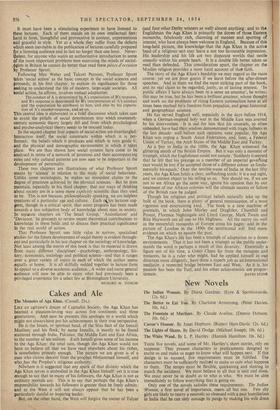Cakes and Ale
The Memoirs of Aga Khan. (Cassell. 21s.) LIKE an agitator's dream of Capitalist Society, the Aga Khan has beamed a pleasure-loving way across five continents and three generations. And now he presents this apologia to a world which might not always have put his achievements in their true perspective.
He is the Imam, or spiritual head, of the Shia Sect of the Ismaili Muslims, and his flock, by name Ismailis, is 'mostly to be found scattered through India, Pakistan, the Middle East and East Africa, to the number of ten million. Each Ismaili gives some of his income to the Aga Khan: the total sum, though the Aga. Khan would not have us believe all that we have read elsewhere about his riches, is nonetheless princely enough. The picture we are given is of a man who claims descent from the prophet Mohammed himself, and who has the Prophet's religious authority.
Nowhere is it suggested that any spark of that divinity which the Aga Khan serves is embodied in the Aga Khan himself: yet it is true enough to say that to many of his followers, the Aga Khan is not as ordinary mortals are. This is to say that perhaps the Aga Khan's responsibility towards his followers is greater than he freely admits: and to the West it will not always appear that he has been a particularly dutiful or inspiring leader.
But, on the other hand, the West will forgive the owner of Tulyar
(and four other Derby winners as well) almost anything: and to the Englishman the Aga Khan is primarily the doyen of those Eastern monarchs, fabulously rich, charming of manner and sporting of interest, who have always been welcome in England. Because of this long-held picture, the knowledge-that the Aga Khan is the active head of a religious sect may leave a not too favourable impression. His leadership and his life are two disparate worlds that nestle uneasily within his ample heart. It is a double life better taken as read than defended. This consideration apart, the chapter on the Muslim religion provides a most lucid account of that faith.
The story of the Aga Khan's headship we may regard as the main course: yet we are poor guests if we leave before the after-dinner speeches. And in them we find the most striking part of the book, and its real claim to be regarded, justly, as of lasting interest. `In public affairs I have always been in a sense an amateur', he writes; this may be true, but he has been a brilliant amateur, whose thought and work on the problems of rising Eastern nationalism have at all times been marked by a freedom from prejudice, and great historical and geographical acumen.
He has served England well, especially in the days before 1914, when a German-inspired holy war in the Middle East was averted by his intervention. It is sad for him that his counsels, so often unheeded, have had their wisdom demonstrated with tragic fullness in the last decade: well before such opinions were. popular, the Aga 'Khan was urging a South Asian Federation, and, later, a Federal Union of Turkey, the Arab States of the Middle East and Turkey.
As a boy in India in the 1880s, the Aga Khan witnessed the glittering zenith of the British Empire. But it was only a moment of triumph, which the Englishman could not sustain : 'Suddenly it seemed that he felt that his prestige as a member of an imperial gover'hing race Would be lost if he accepted those of a different colour as funda- mentally his equals.' Over the terrible waste of India in the last fifty years, the Aga Khan holds a clear, unflinching torch: it is a sad sight, and we cannot object to his telling us so. Nor should we, if we are not to see Africa go the same way, ignore his opinion that by our treatment of our African colonies will the ultimate success or failure of the British race be judged.
Though his religious and political beliefs naturally take up the bulk of the book, there is plenty of general reminiscence, of a most vigorous and entertaining kind. The book is a time machine of portraits, in which John Morley and Diaghilev, Churchill and Proust, Florence Nightingale and Lloyd George, Mark Twain and Rita Hayworth are all one to His Highness. All the merry (as well as the mournful) monarchs of Europe cross his pages: and in the picture of London in the 1890s the sentimantal will find more evidence on which to mourn the past.
The Aga Khan's life has been a triumph of adaptation to a dozen environments. That it has not been a triumph as the public under- stands the word is perhaps a result of this diversity. Essentially a figure out of his time, a Great Cham far from the mosques and minarets, he is a ruler who might, had he applied himself in one direction more diligently, have done a superb job as an international mediator, a respected bridge between East and West. As it is, his passion has been the Turf, and his other achievements are propor-


































 Previous page
Previous page